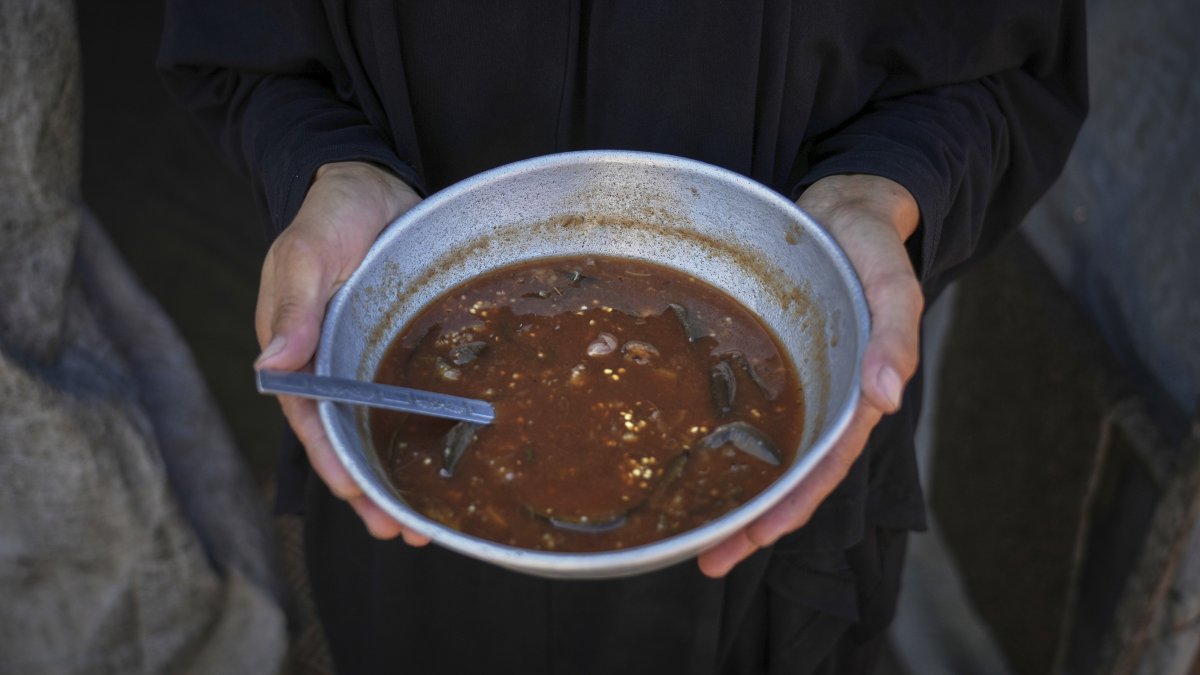A thin bowl of eggplant stewed in watery tomato juice is all that stands between Sally Muzhed’s family of six and hunger for the day. She calls it moussaka, though it is only a faint shadow of the rich, layered meat-and-vegetable dish that once perfumed Gaza’s kitchens.
War has cut families off from their fields and fishing boats, while the little food that trickles into the besieged enclave is often looted, hoarded and resold at punishing prices.
Mothers like Muzhed now survive on constant improvisation, reinventing Palestinian staples with whatever they can snatch from aid trucks, gather from airdrops or buy at the market.
Israel’s total blockade on aid trucks in early March choked supplies for weeks; though deliveries resumed in May, humanitarian groups say they remain far from adequate.
Some cooks have gotten inventive, but most say they are simply desperate to break the dull repetition of the same few ingredients – if they can get them at all.
Some families say they survive on stale, brittle pita; cans of beans eaten cold for lack of cooking gas; or whatever they can get on days they arrive early enough to find meals still available at charity kitchens.
“The children remain hungry. Tomorrow we won’t have any food to eat,” Muzhed said from the tent where her family has been displaced in central Gaza’s Deir al-Balah.
Once, her bowl would barely have fed one child. Now she ladles it out in spoonfuls, trying to stretch it. Her son asks why he cannot have more.
The Muzhed family’s struggle is being repeated across Gaza as the territory plunges deeper into what international experts have called “the worst-case scenario of famine.”
On some days, mothers like Amani al-Nabahin manage to get mujaddara from charity kitchens. The dish, once flavored with caramelized onions and spices, is now stripped to its bare essentials of rice and lentils.
“Nearly nine out of 10 households resorted to extremely severe coping mechanisms to feed themselves, such as taking significant safety risks to obtain food and scavenging from the garbage,” the Integrated Food Security Phase Classification said July 29.
Gas for cooking is scarce, vegetables are costly and meat has all but vanished from the markets.
Families in Gaza once dipped pieces of bread into dukkah, a condiment made of ground wheat and spices.
But today, 78-year-old Alia Hanani is rationing bread by the bite, served once a day at noon, allowing each person to dip it in a wartime dukkah made of flour, lentils and bulgur.
“There’s no dinner or breakfast,” the mother of eight said.
Some people do not even have enough to improvise. All Rehab al-Kharoubi has for her and her seven children is a bowl of raw white beans.
“I had to beg for it,” she said.
For some, it is even less. Kifah Qadih, displaced from Khuza’a east of Khan Younis, could not get any food – the bowl in front of her has remained empty all day.
“Today there is no food. There is nothing.”

The Daily Sabah Newsletter
Keep up to date with what’s happening in Turkey,
it’s region and the world.
SIGN ME UP
You can unsubscribe at any time. By signing up you are agreeing to our Terms of Use and Privacy Policy.
This site is protected by reCAPTCHA and the Google Privacy Policy and Terms of Service apply.

